Informed Consent Seminars – LUMSA University
By Santiago Marcet –
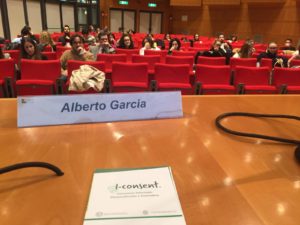 On October 10th and November 12nd, Prof. Alberto Garcia, Director of UNESCO Chair in Bioethics and Human Rights, attended LUMSA’s venues in Rome and Palermo to give a presentation on the details of the European project of i-CONSENT, as well as to explain the intricacies that go along the practical and theoretical notion of informed consent (IC) in clinical research.
On October 10th and November 12nd, Prof. Alberto Garcia, Director of UNESCO Chair in Bioethics and Human Rights, attended LUMSA’s venues in Rome and Palermo to give a presentation on the details of the European project of i-CONSENT, as well as to explain the intricacies that go along the practical and theoretical notion of informed consent (IC) in clinical research.
On a theoretical level, Prof. Garcia highlighted the importance of taking into consideration the factors of gender, age and cultural and religious background if one’s approach to constitute successful patterns of informed consent is to be effective. Thinking about these vulnerability factors will help consolidate i-CONSENT as a person-centered project, as it considers how the above mentioned factors change the way in which patients understand information and communicate with others.
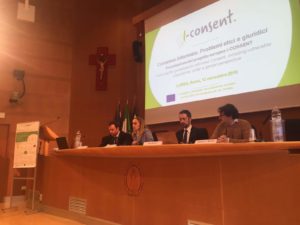 He also approached the tensions that arise from a conceptualization of IC that depends on a notion of individual autonomy that is not shared by all cultures and religions: while western culture tends to give importance to the individual and his or her rights, eastern traditions use to put more weight on community and the duties that derive from it. Thinking about how each major religious tradition (namely Buddhism, Confucianism, Christianity, Judaism, Hinduism and Islam) views IC in accordance to their doctrine and traditions will help to outline defined goals for the effectiveness of i-CONSENT.
He also approached the tensions that arise from a conceptualization of IC that depends on a notion of individual autonomy that is not shared by all cultures and religions: while western culture tends to give importance to the individual and his or her rights, eastern traditions use to put more weight on community and the duties that derive from it. Thinking about how each major religious tradition (namely Buddhism, Confucianism, Christianity, Judaism, Hinduism and Islam) views IC in accordance to their doctrine and traditions will help to outline defined goals for the effectiveness of i-CONSENT.
Prof. Garcia went on to talk about the practical expected outcomes of the project: i-CONSENT intends to be beneficial both for patients and researchers, in a way that will benefit society as a whole. In its person-centered approach it will develop different tests and will aim to involve different physicians in accordance to the profile of the patient, effectively incorporating its principles with their presence on regulatory bodies and ethics groups. The overall goal, according to Prof. Garcia, is to increase the standards of clinical research by making IC form and the whole process more comprehensive and mindful of the patient’s particularities.
You can read more about the i-CONSENT project as it is approached by the UNESCO Chair in Bioethics and Human Rights here: http://www.unescobiochair.org/2017/06/02/new-eu-project-works-on-improving-guidelines-for-informed-consent-including-vulnerable-populations-under-a-gender-perspective/
Visit i-CONSENT’s official website: https://i-consentproject.eu/





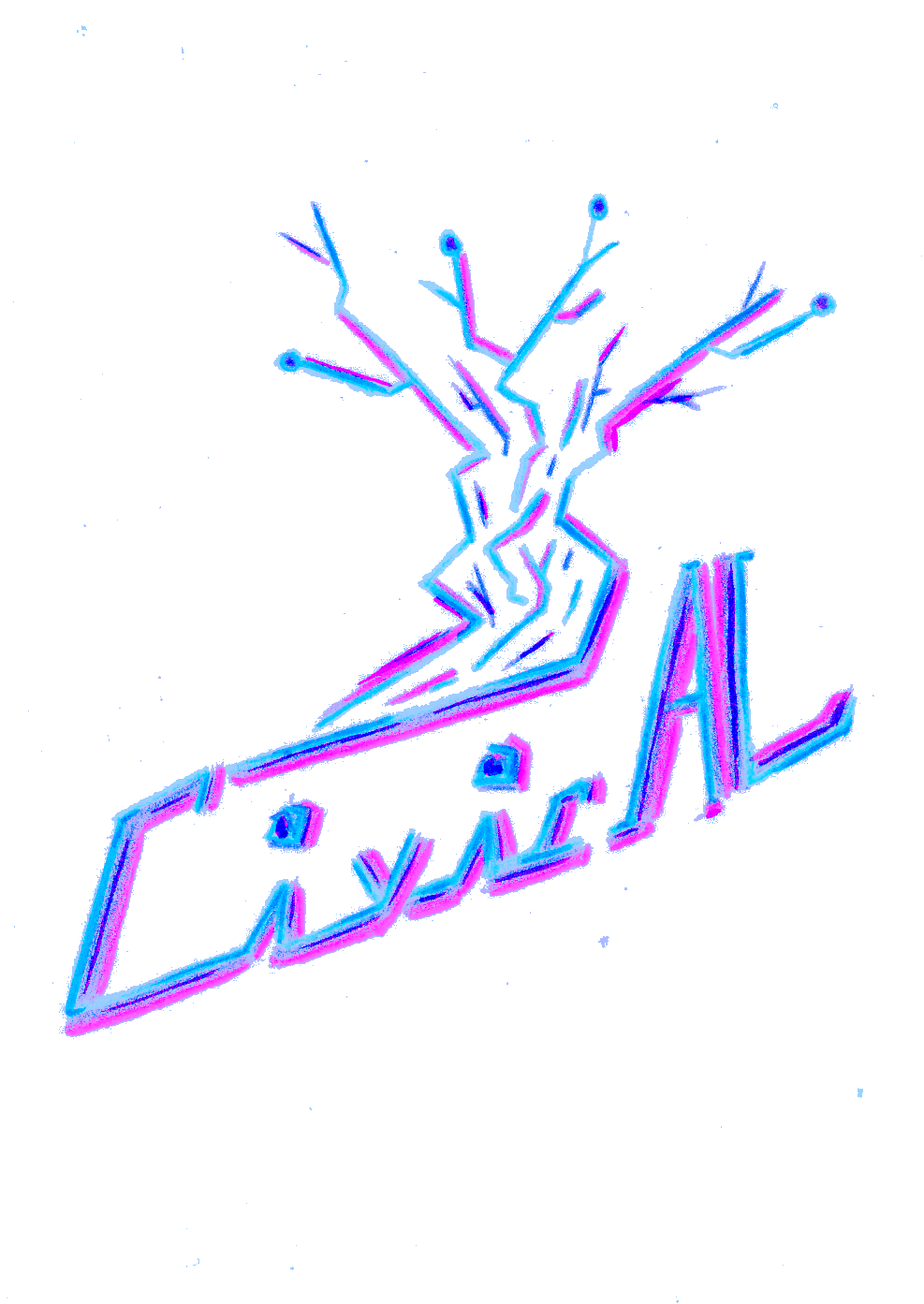
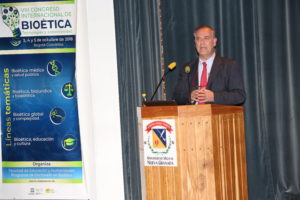 In his lecture titled “Neurobioethics, Placing the Human Being at the Center of Neuroscience, Ethics, and Law” Dr. García reviewed some of the most prominent topics in the field of neurotechnology, and as the title suggests, he was able to explore the ways in which the human being ought to remain the gravitational center of such a rapidly evolving reality.
In his lecture titled “Neurobioethics, Placing the Human Being at the Center of Neuroscience, Ethics, and Law” Dr. García reviewed some of the most prominent topics in the field of neurotechnology, and as the title suggests, he was able to explore the ways in which the human being ought to remain the gravitational center of such a rapidly evolving reality.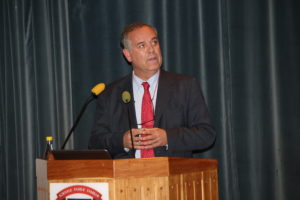 This perception of the human being introduced Dr. García’s next discussion, namely the bioethics of neuroscience. As he insisted, a position open to progress and change must belong to all bioethicists, as long as the overarching anthropological view is not lost. Moral judgement, he stated, must focus on two elements when talking about neuroscientific ends: the means by which they are achieved and their intention. Drawing on this distinction, Dr. García talked about the essential differences between therapy and enhancement, which lead him to address Transhumanism in a neutrally critical way: the disposition to endow the human being with a higher degree of dignity by means of biological enhancement can prove to be a slippery slope, and common good must prevail over individual dispositions. Many questions surround this topic: does all scientific advance constitute progress? Will enhanced human capabilities increase the already existing gap between the rich and the poor? Will the transhuman being constitute a new paradigm that will make the concept of human singularity blur? These and many other issues should always be addressed bearing the idea of human dignity in mind.
This perception of the human being introduced Dr. García’s next discussion, namely the bioethics of neuroscience. As he insisted, a position open to progress and change must belong to all bioethicists, as long as the overarching anthropological view is not lost. Moral judgement, he stated, must focus on two elements when talking about neuroscientific ends: the means by which they are achieved and their intention. Drawing on this distinction, Dr. García talked about the essential differences between therapy and enhancement, which lead him to address Transhumanism in a neutrally critical way: the disposition to endow the human being with a higher degree of dignity by means of biological enhancement can prove to be a slippery slope, and common good must prevail over individual dispositions. Many questions surround this topic: does all scientific advance constitute progress? Will enhanced human capabilities increase the already existing gap between the rich and the poor? Will the transhuman being constitute a new paradigm that will make the concept of human singularity blur? These and many other issues should always be addressed bearing the idea of human dignity in mind.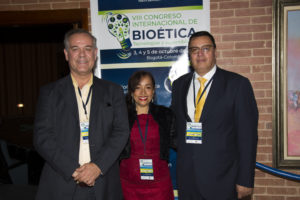 Reversing the actors of his previous discussion, Dr. García talked about the neuroscience of ethics. Or in other words, the ways in which neuroscience can help us understand the intricacies of our moral thought. He explained the problems that arise from the implantation of recent theories that deny the existence of human free will. If there is indeed a measurable relation between certain brain structures and human behavior, if human choices are nothing more than the end of a chain of causality that is merely material, he states, the concepts of responsibility (in moral terms) and imputability (in legal terms) lose all meaning.
Reversing the actors of his previous discussion, Dr. García talked about the neuroscience of ethics. Or in other words, the ways in which neuroscience can help us understand the intricacies of our moral thought. He explained the problems that arise from the implantation of recent theories that deny the existence of human free will. If there is indeed a measurable relation between certain brain structures and human behavior, if human choices are nothing more than the end of a chain of causality that is merely material, he states, the concepts of responsibility (in moral terms) and imputability (in legal terms) lose all meaning.